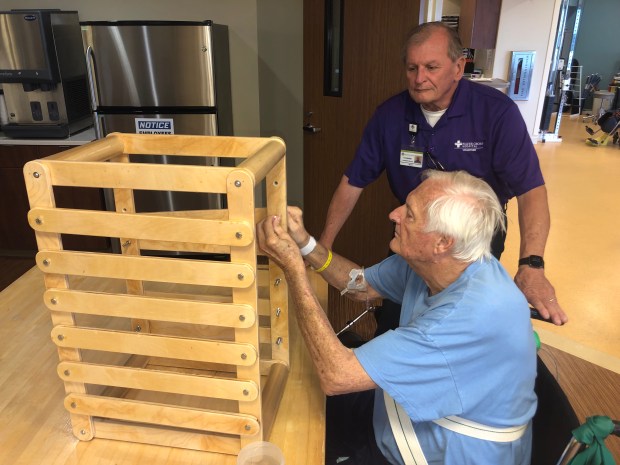A Mokena man’s amazing recovery from not being able to use his arms and legs to walking out of the hospital just weeks later inspired him to volunteer with the physical therapists who helped him.
Boller “Bo” Boll became a virtual quadriplegic in 2023 because of Guillain-Barre syndrome. He turned to the Shirley Ryan Ability Lab at Silver Cross Hospital in New Lenox to build his inner core and muscles.
“I guess we’ll have to say from the day I got into Silver Cross Hospital until the day I walked out of there was 39 days,” Boll said. “I came into Silver Cross as a total quadriplegic and walked out of there 39 days later. I had some incredible therapists and nurses.”
Gratitude for his recovery and with a solid background in service from attending Catholic schools and volunteering as a firefighter/EMT for 20 years, Boll decided to get involved at the ability lab.
“It’s just in my nature to give back. I felt that from the position I was in – totally paralyzed – to walking out of the hospital, I owed them something,” he shared. It also was a way of keeping him “out of trouble — it gives you something to do so you won’t be sitting in your garage.”
Boll, a union carpenter with 45 years in the field before retiring as a construction superintendent, is “an avid woodworker with a well-equipped shop as well as a fair metalworking shop,” he said. He saw an opportunity in being able to enhance, replace or modify items in the ability lab to better suit patients.
He built a device to improve finger dexterity that has four threaded rods in a vertical position with threaded nuts that patients run up and down the device. “I’ve probably redesigned six or eight different things that I felt were working far more than what some factory put out,” he said.
One important piece of equipment that received a makeover was a step platform used by people to regain mobility while using a walker.
“They had a step that was 8.5 inches high, but a step in normal circumstances is 7 to 7.5 inches. It was a platform they had that was 24 inches wide, which is just about the width of the walker. If you put a walker on it and move in either direction, the walker would fall off it,” he explained.
“We built a platform that was 32-by-36 that was 7-inches high. They could walk across it actually and step down again,” he said. “The other day that therapist asked me if I could build a ramp. I said I think so, so I built a ramp to match the platform that we have. It worked out pretty good.”
Boll volunteers two or three hours a day two or three days a week at the ability lab, working both with equipment and with patients. One of his favorite things to do is “to talk to the therapists and see how they are doing, and talk to a couple of patients if they want me to,” he said.
“We’re just getting started with this so we’re feeling the program out,” he said. “It’s kind of new to the therapists to have someone like me come on board. A few therapists have said ‘I have a patient. I’d like you to meet him.’”
One of those patients was a somewhat despondent 85-year-old man who had fallen three days earlier.
“He was not happy about falling and breaking his hip. He’s a part-time woodworker and we started talking about that,” Boll said. “If I can bring a little cheer to somebody, that makes me happy.”
Although he is grateful for the many employees at Silver Cross who helped him recover, Boll also has another important person on his team: his wife, Sandy, a teacher who took time off from her job.
“Sandy was there around the clock,” he said. “She’d come in at 6 a.m. and feed me and go to school and come back at 4:30 or 5 with new clothes and do some class lessons until 8:30 or 9 and then she’d do it again the next day.”
Sandy Boll said she and Bo met in 1998 and have been married since March 2022, but they’ve had many health crises, including Bo’s triple bypass open-heart surgery and a hospitalization after shoulder surgery when he developed blood clots.
“Luckily, he must have nine lives as he negotiated a successful recovery each time,” she said. “Throughout his many surgeries and hospitalizations he has always remained positive and persevered in therapy to recover.”
She called Guillain-Barre syndrome the toughest hurdle yet.
“The process necessary to make a diagnosis and then the uncertainty surrounding the length of his recovery must have weighed heavily on him as he lay in bed daily,” she shared. “I did my best to remain positive and we both refused to believe that he wouldn’t make a full recovery. We trusted the doctors and therapists, and Bo really pushed himself to improve daily.”
She said the hospital’s therapy team, floor supervisor, nurses, assistants and doctors were amazing in analyzing, researching and creating a plan for Bo’s recovery.
“The entire team stayed positive and motivated him to continue even when there initially was little improvement,” she said. “Choosing where to receive therapy was a difficult decision to make. We are blessed that we made the right choice. Without this great group of people I doubt he would have recovered so quickly and completely. They’re miracle workers!”
She said Bo’s experience with the ability lab can help others. “Much of his recovery process was dependent on his mental attitude. Bo understands how it feels to be the patient and also knows how important it is to trust your doctors and therapists even when recovery is slow,” she explained.
“He wants to help others who may be in the same position he was once in to adapt and persevere and provide hope and support as they work through their recovery.”
Melinda Moore is a freelance reporter for the Daily Southtown.





